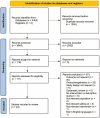Psychological Stress Management and Stress Reduction Strategies for Stroke Survivors: A Scoping Review
- PMID: 35689664
- PMCID: PMC9899067
- DOI: 10.1093/abm/kaac002
Psychological Stress Management and Stress Reduction Strategies for Stroke Survivors: A Scoping Review
Abstract
Background: Stroke can be a life-changing event, with survivors frequently experiencing some level of disability, reduced independence, and an abrupt lifestyle change. Not surprisingly, many stroke survivors report elevated levels of stress during the recovery process, which has been associated with worse outcomes.
Purpose: Given the multiple roles of stress in the etiology of stroke recovery outcomes, we aimed to scope the existing literature on stress management interventions that have been trialed in stroke survivors.
Methods: We performed a database search for intervention studies conducted in stroke survivors which reported the effects on stress, resilience, or coping outcome. Medline (OVID), Embase (OVID), CINAHL (EBSCO), Cochrane Library, and PsycInfo (OVID) were searched from database inception until March 11, 2019, and updated on September 1, 2020.
Results: Twenty-four studies met the inclusion criteria. There was significant variation in the range of trialed interventions, as well as the outcome measures used to assess stress. Overall, just over half (13/24) of the included studies reported a benefit in terms of stress reduction. Acceptability and feasibility were considered in 71% (17/24) and costs were considered in 17% (4/24) of studies. The management of stress was rarely linked to the prevention of symptoms of stress-related disorders. The overall evidence base of included studies is weak. However, an increase in the number of studies over time suggests a growing interest in this subject.
Conclusions: Further research is required to identify optimum stress management interventions in stroke survivors, including whether the management of stress can ameliorate the negative impacts of stress on health.
Keywords: Depression; Resilience; Stress; Stress intervention; Stress management; Stroke.
© The Author(s) 2022. Published by Oxford University Press on behalf of the Society of Behavioral Medicine.
Figures
Similar articles
-
Exploration of stress management interventions to address psychological stress in stroke survivors: a protocol for a scoping review.BMJ Open. 2020 Mar 26;10(3):e035592. doi: 10.1136/bmjopen-2019-035592. BMJ Open. 2020. PMID: 32220915 Free PMC article.
-
Mind-Body Interventions, Psychological Stressors, and Quality of Life in Stroke Survivors.Stroke. 2019 Feb;50(2):434-440. doi: 10.1161/STROKEAHA.118.021150. Stroke. 2019. PMID: 30612536
-
Beyond the black stump: rapid reviews of health research issues affecting regional, rural and remote Australia.Med J Aust. 2020 Dec;213 Suppl 11:S3-S32.e1. doi: 10.5694/mja2.50881. Med J Aust. 2020. PMID: 33314144
-
Interventions for adults with a history of complex traumatic events: the INCiTE mixed-methods systematic review.Health Technol Assess. 2020 Sep;24(43):1-312. doi: 10.3310/hta24430. Health Technol Assess. 2020. PMID: 32924926 Free PMC article.
-
Telephone interventions for symptom management in adults with cancer.Cochrane Database Syst Rev. 2020 Jun 2;6(6):CD007568. doi: 10.1002/14651858.CD007568.pub2. Cochrane Database Syst Rev. 2020. PMID: 32483832 Free PMC article.
Cited by
-
A scoping review of stroke rehabilitation in Africa: interventions, barriers, and research gaps.J Health Popul Nutr. 2025 Jul 10;44(1):245. doi: 10.1186/s41043-025-01004-z. J Health Popul Nutr. 2025. PMID: 40640909 Free PMC article.
-
Mental Stress and Cognitive Deficits Management.Brain Sci. 2024 Mar 27;14(4):316. doi: 10.3390/brainsci14040316. Brain Sci. 2024. PMID: 38671968 Free PMC article.
-
Perceived social support, self-management, perceived stress, and post-traumatic growth in older patients following stroke: Chain mediation analysis.Medicine (Baltimore). 2024 Jul 19;103(29):e38836. doi: 10.1097/MD.0000000000038836. Medicine (Baltimore). 2024. PMID: 39029078 Free PMC article.
-
A Bibliometric Analysis of Research Trends in Psychological Interventions for Stroke Survivors: Focusing on Resilience and Psychological Well-Being (2000-2024).J Multidiscip Healthc. 2025 Mar 19;18:1655-1678. doi: 10.2147/JMDH.S505135. eCollection 2025. J Multidiscip Healthc. 2025. PMID: 40125304 Free PMC article. Review.
-
A Systematic Scoping Review of Measures Used to Evaluate Treatment-Induced Changes in Depression, Anxiety, and Chronic Stress in People with Post-Stroke Aphasia.Aphasiology. 2025 Mar 5:10.1080/02687038.2025.2467234. doi: 10.1080/02687038.2025.2467234. Online ahead of print. Aphasiology. 2025. PMID: 40857538
References
-
- DALYs GBD, Collaborators H. Global, regional, and national disability-adjusted life-years (DALYs) for 359 diseases and injuries and healthy life expectancy (HALE) for 195 countries and territories, 1990–2017: a systematic analysis for the Global Burden of Disease Study 2017. Lancet. 2018;392(10159):1859–1922. - PMC - PubMed
-
- O’Donnell MJ, Chin SL, Rangarajan S, et al. . Global and regional effects of potentially modifiable risk factors associated with acute stroke in 32 countries (INTERSTROKE): a case-control study. Lancet. 2016;388(10046):761–775. - PubMed
-
- Assayag EB, Tene O, Korczyn A, et al. . High hair cortisol concentrations predict worse cognitive outcome after stroke: results from the TABASCO prospective cohort study. Psychoneuroendocrinology. 2017;82:133–139. - PubMed
Publication types
MeSH terms
LinkOut - more resources
Full Text Sources
Medical
Miscellaneous



